 Petzlover
Petzlover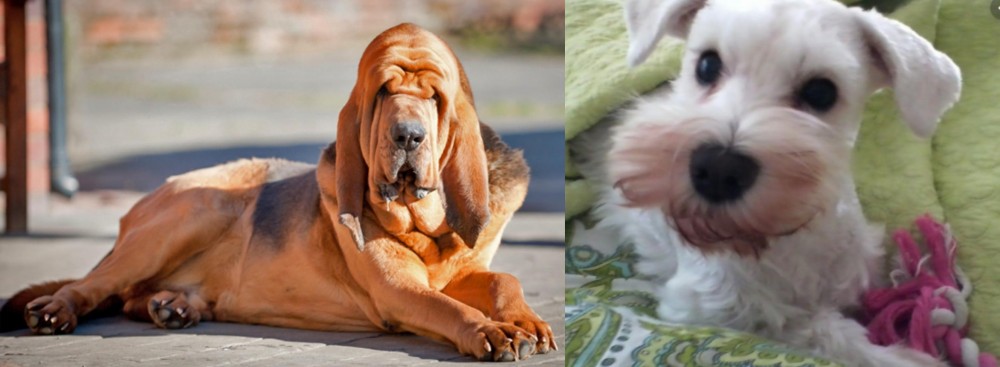 Bloodhound is originated from United Kingdom but White Schnauzer is originated from Germany. Bloodhound may grow 18 cm / 8 inches higher than White Schnauzer. Bloodhound may weigh 65 kg / 144 pounds more than White Schnauzer. Bloodhound may live 6 years less than White Schnauzer. Bloodhound may have more litter size than White Schnauzer. Bloodhound requires Low Maintenance. But White Schnauzer requires Moderate Maintenance
Bloodhound is originated from United Kingdom but White Schnauzer is originated from Germany. Bloodhound may grow 18 cm / 8 inches higher than White Schnauzer. Bloodhound may weigh 65 kg / 144 pounds more than White Schnauzer. Bloodhound may live 6 years less than White Schnauzer. Bloodhound may have more litter size than White Schnauzer. Bloodhound requires Low Maintenance. But White Schnauzer requires Moderate Maintenance
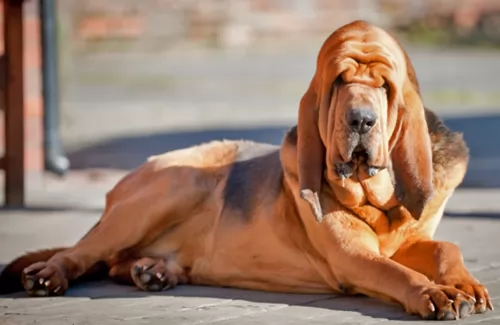 The history of the Bloodhound breed is a fascinating one. Known as a Sleuthhound for its ability to smell out the culprit and bag the prey. Even more so the Bloodhound is known for tracking and finding lost people. He is famous for finding human scents and being able to follow them even days or weeks after the person is lost. They are also able to track people over a great amount of land and have been known to successfully track escaped prisoners or wanted criminals. They are descended from the Saint-Hubert Hounds that were bred at the Abbey/Monastery at Saint-Hubert, Belgium. According to the legends the St. Hubert hounds were bred by the Monks in 1000AD. This hound was thought to be a mixed breed rather than a purebred. That’s because the ancestry of this hound is not really known but it is known that the monks bred them and sent several to the King of France annually. Only black hounds were gifted.
The history of the Bloodhound breed is a fascinating one. Known as a Sleuthhound for its ability to smell out the culprit and bag the prey. Even more so the Bloodhound is known for tracking and finding lost people. He is famous for finding human scents and being able to follow them even days or weeks after the person is lost. They are also able to track people over a great amount of land and have been known to successfully track escaped prisoners or wanted criminals. They are descended from the Saint-Hubert Hounds that were bred at the Abbey/Monastery at Saint-Hubert, Belgium. According to the legends the St. Hubert hounds were bred by the Monks in 1000AD. This hound was thought to be a mixed breed rather than a purebred. That’s because the ancestry of this hound is not really known but it is known that the monks bred them and sent several to the King of France annually. Only black hounds were gifted.
Some kings preferred not to hunt with these hounds thinking them not good enough while others thought the only use for them was as a leash hound. All described the St. Hubert as long in body with short legs. These gifts continued until the French Revolution when hunting in France was greatly reduced until the 19th century. The original St. Hubert strain became extinct in the 19th century and that the current European St. Hubert hound has its origins in the Bloodhound. The Bloodhound as a separate breed was already established in Europe by the middle of the 14th century. They were used as leach hounds to sniff out the prey so that the pack hounds could chase and keep it “at bay”. They were also used from the beginnings of the breed to track humans. At this time they were often known as sleuth hounds. As recorded by John Caius – the authority on Bloodhounds from their origins – writes about the breeds ability to find and track the scent of blood – thus becoming the Bloodhound and its use to track poachers and thieves. He also reported that the Bloodhound and the Sleuth Hound were the same basic breed. The number of Bloodhounds in Britain gradually declined until few remained after World War II. Britain has gradually built their breed back up by importing dogs from America. It was during the 19th century that the Bloodhound was imported into France by breeders who wished to reestablish the St. Hubert Hound. Thus the St. Hubert is both the ancestor and descendent of the Bloodhound. The Britain’s continue to believe that the Bloodhound is a native British breed.
The Bloodhounds in America have had great success as companion animals, with police departments and forest rangers and showing in the prestigious Westminster Kennel Club in New York. There are more Bloodhounds in the United States than anywhere else in the world.
In the end the Anglo-Saxton Bloodhound cannot be specified with any real certainty. Many believe it was not the St. Hubert that the Bloodhound descended from but rather the Norman hound or the sleuth-hound. Many believe it could have included other breeds such as the southern hound, the dun-hound and the Talbot. It cannot be proven today it the Bloodhound’s origins come from Belgian or England.
 The White Schnauzer was established in Germany in 2006 for people looking for this particular breed of dog but in white.
The White Schnauzer was established in Germany in 2006 for people looking for this particular breed of dog but in white.
The traditional color is salt and pepper. It seems that breed societies don’t allow the white breed, saying they don’t conform to the ideal breed standard.
The White Schnauzer is officially recognized in Germany, If you have a White Schnauzer you may not be able to show him with some of the major kennel clubs.
White is one of the four color varieties of the Miniature Schnauzer and it is also recognized by the Fédération Cynologique Internationale.
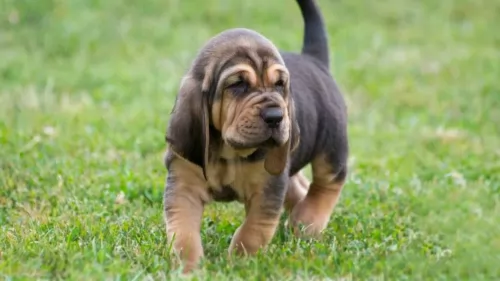 When being judged for confirmation in a show ring, the preference is for a larger dog, with an unusual skeleton in respect to its large size and heavy weight in the bones. They have a narrow head, flat at the sides, but long. They have deep set eyes buried in the deep, long face and wrinkles. The eyes might be yellow or run the gamut to deep hazel depending upon the color of the dog. The long velvety ears and thin and low set on the head. These long ears are as much a part of the Bloodhounds Olfactory system as his amazing nose. They curl backward and inward as the ends. There is a large amount of loose skin on the head and at the jowls. When the Bloodhound lowers his head the loose folds and ridges of skin are prominent on the face and forehead.
When being judged for confirmation in a show ring, the preference is for a larger dog, with an unusual skeleton in respect to its large size and heavy weight in the bones. They have a narrow head, flat at the sides, but long. They have deep set eyes buried in the deep, long face and wrinkles. The eyes might be yellow or run the gamut to deep hazel depending upon the color of the dog. The long velvety ears and thin and low set on the head. These long ears are as much a part of the Bloodhounds Olfactory system as his amazing nose. They curl backward and inward as the ends. There is a large amount of loose skin on the head and at the jowls. When the Bloodhound lowers his head the loose folds and ridges of skin are prominent on the face and forehead.
For many centuries all different colors of Bloodhounds could be found. Today however they are pretty much red, black and tan and black and liver. The Bloodhound is a powerful dog and is larger than most breeds of hounds.
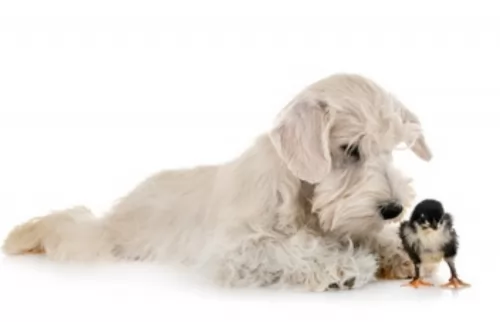 There are a number of different types of White Schnauzer. The white Schnauzer is actually one of 4 color varieties and these dogs are always miniature Schnauzers.
There are a number of different types of White Schnauzer. The white Schnauzer is actually one of 4 color varieties and these dogs are always miniature Schnauzers.
You won’t easily find a Standard- or Giant dog in white. They aren’t albinos, as the skin does have some pigment.
These dogs also have that square-shaped build and they stand between 28 to 36 cm in height and weigh between 4 and 7kg.
The coat is wiry with a soft undercoat. The ears are often cropped to stand erect, but if left they are half-erect, half-floppy and fold forward.
The White Schnauzer is an intelligent dog who will be able to be socialized and trained easily.
He is an energetic little dog and very playful and will get along well with children, loving the games they provide and loving to spend time with all members of his family.
He is loving and affectionate and is willing to share his home and people with other dogs too. He will make you a good watchdog, perhaps encouraged because of his reserve with strangers.
If you provide him with the right amount of mental and physical stimulation, he can become a balanced dog with an amicable personality.
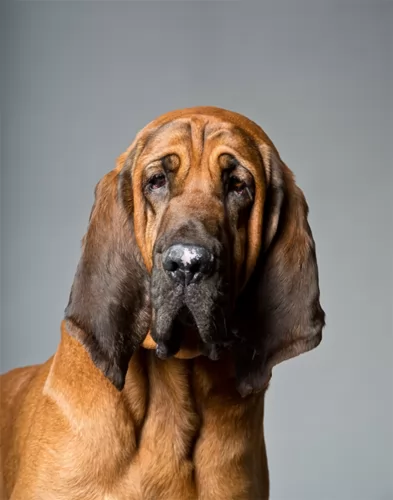 The Bloodhound is known as a gentle soul and he truly is. They are affectionate and gentle with people and children. However, their strong will to track can make them stubborn and hard to handle and train. They are easy going dogs and really like to be with people, children and other dogs. They are affectionate but tend to be set in their ways.
The Bloodhound is known as a gentle soul and he truly is. They are affectionate and gentle with people and children. However, their strong will to track can make them stubborn and hard to handle and train. They are easy going dogs and really like to be with people, children and other dogs. They are affectionate but tend to be set in their ways.
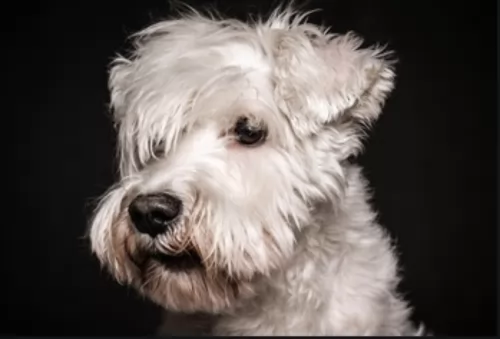 The White Schnauzer is such an adaptable little dog and he will happily adapt to life in the city or in the countryside, just so long as he is close to his human companions and gets sufficient exercise.
The White Schnauzer is such an adaptable little dog and he will happily adapt to life in the city or in the countryside, just so long as he is close to his human companions and gets sufficient exercise.
He is a sociable dog that just loves to be around his human family and won’t like to be separated from them for too long.
He makes a great family dog when you provide him with the right food, a warm dry place to sleep, exercise and lots of love and attention.
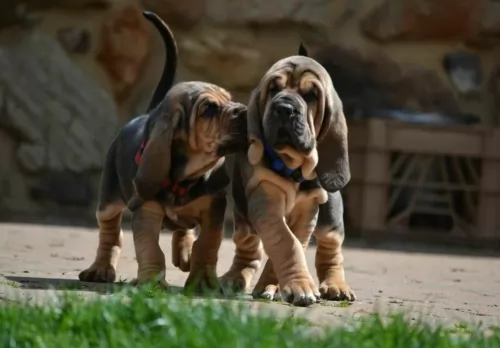 Obviously with ears like the Bloodhound there is always a chance for problems and serious infections. The ears need to be cleaned daily. Because their coat is so thick, they can overheat easily, and they are very prone to bloat, as are many large animals. However, with the Bloodhound, Bloat is the number one killer. Their lifespan is one of the shortest of all dogs at 6.75 years.
Obviously with ears like the Bloodhound there is always a chance for problems and serious infections. The ears need to be cleaned daily. Because their coat is so thick, they can overheat easily, and they are very prone to bloat, as are many large animals. However, with the Bloodhound, Bloat is the number one killer. Their lifespan is one of the shortest of all dogs at 6.75 years.
 While he is a spunky, robust type of dog, there are always going to be some health concerns to look out for.
While he is a spunky, robust type of dog, there are always going to be some health concerns to look out for.
Kidney stones may well not cause your pet the same pain that humans endure, but they are still a cause for concern. A kidney stone that gets too large and lodges in the ureter becomes a ureterolith. This can be very painful, resulting in pain and even vomiting.
The kidney can even swell and become damaged. Your dog could become critically ill, particularly because of the disrupted flow of urine.
Your pet will possibly have blood in the urine, fever, lethargy, poor appetite and weight loss. Veterinary-intervention will be imperative.
 The Bloodhound is not a high energy, fast moving dog but that does not mean he doesn’t have serious nutritional needs. An overweight Bloodhound is on a course to an early demise. They should be fed a high-quality food once a day or split into two daily servings. Do not feed them right before or right after strenuous exercise and remember that strenuous exercise for a Bloodhound is considerably less than it is for a terrier.
The Bloodhound is not a high energy, fast moving dog but that does not mean he doesn’t have serious nutritional needs. An overweight Bloodhound is on a course to an early demise. They should be fed a high-quality food once a day or split into two daily servings. Do not feed them right before or right after strenuous exercise and remember that strenuous exercise for a Bloodhound is considerably less than it is for a terrier.
As previously mentioned the number one cause of death in Bloodhounds is Bloat. They are also prone to cancer. They have minor issues with their eyes, but their ears and skin are also major concerns. Clean the ears daily and wipe out the skin folds and wrinkles to prevent infections. They should be test for hip and elbow dysplasia simply because they are large dogs, though these conditions are less common in Bloodhounds.
Though the Bloodhound is known as a couch potato his stamina and activity levels are usually greatly underestimated. He can follow a scent for 7-10 hours over miles of terrain with out a problem. He needs daily exercise such as long walks on a leash. Do not take your Bloodhound out off leash because if he picks up a scent and wanders off you will not be able to get his attention to call him back.
 He is a low shedding breed so he will require a brushing just once a week. These dogs also have a certain professional grooming cut. Some schnauzer dog owners do stripping but this is mostly for show dogs.
He is a low shedding breed so he will require a brushing just once a week. These dogs also have a certain professional grooming cut. Some schnauzer dog owners do stripping but this is mostly for show dogs.
Most people just have them sheared to make it easy to groom them. Whether stripped or clipped, they nearly always have a beard and bushy eyebrows.
Trim your pet's nails and give him a general once-over during the grooming sessions to ensure all is well.
You White Schnauzer relies on you to make wise food choices for him. He will eat most things you offer him. That doesn’t mean you should as you can cause him to have a whole lot of digestive problems.
If you choose to give him commercially manufactured dog food, make sure its a high-quality one – devoid of toxic ingredients such as colorants, fillers and preservatives.
If you don’t know how to choose, your vet can show you the foods they have in stock and which would suit your pet best.
A little bit of home-made food now and then can also be good, but the food needs to be plain and simple to avoid abdominal pain. Boiled chicken brown rice and vegetables chopped up and added to the dry kibble occasionally can be a very good choice.